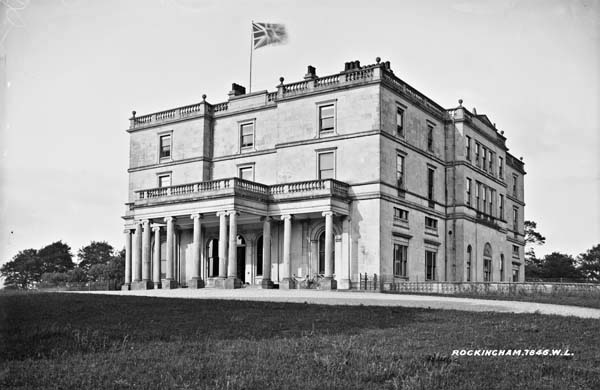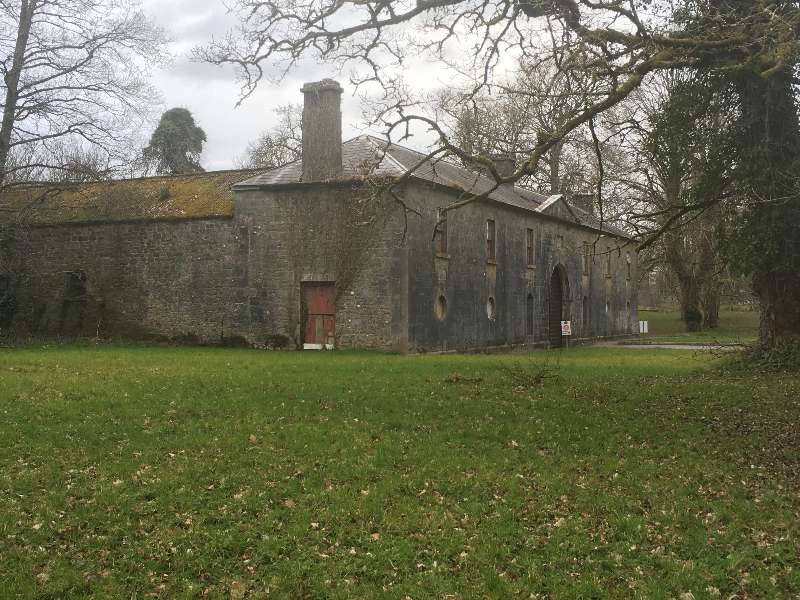63 year anniversary of Rockingham House fire

The devastating fire which destroyed Rockingham House took place 63 years ago today, on Tuesday September 10th 1957.
The fire reportedly started at 7pm in the evening and was still smouldering on Wednesday evening the following week.
It was reported that Sir Cecil and his wife were at the Doncaster Horse Sales at the time of the fire, an event that marked the end of an era in Rockingham.
Rockingham House, built to the design of the architect John Nash in 1803, was initially destroyed by fire in 1863 but was rebuilt again before being destroyed in 1957.
Here is an eyewitness report from the night of a fire courtesy of the book “Rockingham House – Memories of a Vanished Mansion”…..
“Rockingham House was in darkness as we arrived. As yet there was no sign of the holocaust that was to consume this beautiful mansion in the space of a few hours. New vehicles were parked on the drive and hurrying figures dashing in and out though the portals that dominated the west side. We were told there was a fire in the basement and that furniture and other movable were being cleared from the house in the case the fire spread. There was earnestness and a haste about the rescue operations but there was no panic. We were told that the fire was confined to the basement and that fire brigades had the situation well in hand. In the entrance hall we had our first contact with the fire. Thick smoke from the burning timber clouded the air and seared the eyes. Visibility was nil, for the electric light had failed when the fire burned the wires. We groped our way about the hall, bumped into figures scurrying for the door with chairs and tables. Two ghostly figures collided in the drawing room door and laughed. The seriousness of the situation had not yet made itself felt. We joined in the clearance of the drawing room. One or two torches provided all the light there was, until somebody thought of switching on the lights of a car and focussing them on the window. The headlamps stabbed two shafts of light through the smoke and we looked about to see what we might clear out to the lawn. ‘Ah, the fire will never come this far. You needn’t bother about that big painting. Anyhow, you would never get it down’, I don’t know who give this advice but it was taken – for the time being. Later, when the fire started to spread, the painting was removed – unceremoniously. The chain holding it was pulled from the socket in the wall and willing hands hauled this priceless possession to safety. But the fire was only an hour or so old yet, and though the clearance proceeded it was done at a leisurely pace.
In The Basement
I decided to have a look at the fire and went to the basement. In a celler-like space under the very centre of the house firemen were playing a hose on a fire which seemed to fill the whole cellar. The heat was intense and the searing timber smoke did not allow a long delay in the underground passage. I watched for a while and wondered if the fire had gone to the next floor. I entered the ground floor from the veranda on the south side of the house. The blaze had started to come though the floor boards. And was scorching the walls and hangings. I called one of the firemen and he agreed that an effort should be made to damp down this outbreak and keep it from going to the roof. The hose from the basement was brought into action after the hall was cleared of its contents, which included some painting, antique furniture and some plants.
Gaining ground
Meanwhile the fire brigades were carrying on with the business at the rear and there was a growing feeling that the fire was gaining ground. Service bells, the current short-circuited by the fire, were ringing shrilly through the house.’ The roof is on fire’. The shout brought a stunned silence that was broken only by the clatter of the pumps drawing water from the lake. A ladder was procured and an effort made to direct water to the blazing portion of the roof. Another shout went up: ‘Get everybody out of the house’ and there was a quick check round to see if everybody was out. Somebody thought the cook was still inside and there was a rush to get her out. The cook, however, had already got out to safety. Somebody else went in to rescue the dog, but the dog was not to be found. One dog had already been rescued. The other was overcome by smoke and perished in the flames. Now the fire had got a grip and it spread rapidly. It was nearly two o’ clock when the first awning came in the roof, over a room on top floor in the centre of the house, facing south. The window was brilliantly lighted up and the flames lapped at the curtain. They burned fiercely and set alight the timber surrounds. One hose played vainly on the lighted window. It was thought that the jet of water would break the glass. When this failed, stones were thrown to break the glass. These also failed. But the fire ‘ did the trick’ and the glass clattered on to the cement below. The fire blazed furiously as the draught swept through the window but it made no visible impression on the spread of the fire.
Had it
Then another portion of the roof collapsed in a blazing crash, then another and another. It was obvious now that the house, to use a modern phrase, had had it. We gathered in on the ground floor and, with everybody aware that the place was doomed, an all-out effort was made to save everything possible. Beautiful inlaid mahogany cabinets, laden with priceless china sets, resisted efforts to open them. A weight was procured, the fronts of the cabinets were smashed and the china carried to safety. Painting were torn from the walls and brought out to the lawn. Chairs, couches and tables were hurried from the rooms. In the estate office a firemen hacked the safe from the wall and it, and files and documents, were taken by willing workers to safety. Huge cases of books had to be abandoned. So, too, had massive chandeliers, huge mirrors and seats. We had plenty of light now. Three massive glass domes in the roof of the long hall let thought the light of the blazing roof. We after cascaded down the walls and ran along the floor. We dashed up the sodden carpet of the beautiful marble staircase, hauled further paintings from the walls and passed them on to others who brought them to safety. Some pictures were still left when the glass domes cracked with the heat. It was no longer safe to remain within. There was a quick check around to see if there was anything valuable that could be rescued. We grabbed whatever we could and left. The floor and a door at the end of the corridor were then in a blazing inferno and the collapse of the roof told us how close the end was. By three o’ clock the whole roof was a mass flame had helped to clear was alight. Windows crashed, timber blazed and crackled, a kettle steamed on a cooker in the kitchen. We stood on the trim, well-kept lawn which sweeps down to the shore of beautiful Lough Key. Birds frightened by the glare and the noise fluttered around us in the breaking dawn light. Before us was the blazing shell of the once beautiful mansion that was Rockingham House. It is hard to recollect the thoughts that sweep thought the mind on a momentous occasion – for momentous it was. We were looking at the end of an era, an era which brought ashes, a smouldering ruin that cast a red glow in the eastern sky as we wended our way down the avenue, along many changes to Ireland, the Ireland in which the ‘ Big House’, such as Rockingham then was, passed from being the epitome of an oppressive power to become an object of curiosity and an attraction for sightseers and tourists. All that Rockingham meant to an oppressed people in the days gone by had been passed and gone and if it was destroyed a hundred years ago it would have been an occasion for rejoicing. But to the people of the area in late years Rockingham house was something of which they were proud, a stately home which was an architectural gem and which had somehow symbolised the changes that had taken place, without being changed itself. Now it was gone, into dust and the famous beech walk, back to the sleeping town of Boyle. Somehow or other we were sorry that Rockingham was burned.”




